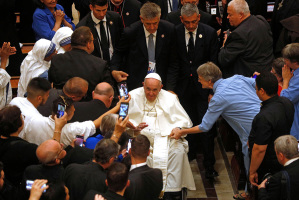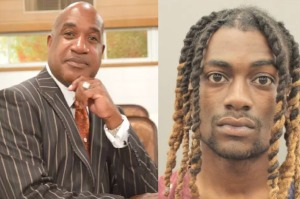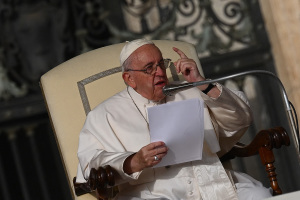Is Muammar al-Gaddafi Preparing to Quit?
South African President Jacob Zuma’s meeting with Muammar al-Gaddafi in Tripoli Monday fell short of a peace deal and a report suggested that Libya’s embattled ruler had secretly engaged attorneys to defend him at the International Criminal Court.
A South African daily, The Times, claims that Gaddafi’s men have hired attorneys from a South African firm to defend him against the charges of crime against humanity and human rights violations that may follow his stepping down. The Johannesburg-based daily said senior Libyan officials met a partner of the Langa Attorneys law firm, Themba Langa, three weeks ago.
The attorneys will provide legal advice and services to Gaddafi and other leaders, the daily added. “The deal will include defending Libyan government officials in the event that they are hauled before the International Criminal Court on charges of human rights abuses.”
“Langa was not available for comment, but The Times understands that his firm was asked to assemble a team of international law experts to put together Gaddafi’s defence strategy if he quits,” added the daily. Based in Parktown North, a suburb of Johannesburg, the firm specializes in corporate law but also provides a wide spectrum of legal services, according to its website.
This shows that while Gaddafi has entertained the South African president’s mediation efforts since April, he has little confidence in its outcome.
After meeting Gaddafi in Tripoli Monday, President Zuma spoke to journalists saying Gaddafi had accepted the African Union’s roadmap to resolve the conflict, but “on condition that NATO and [others[ stop bombing and give the Libyan people a chance to solve their problems by themselves.” Zuma denied reports that he was there to discuss an “exit strategy” for Gaddafi – and by doing so he further damaged his credibility as a mediator.
Zuma wants an immediate ceasefire followed by talks on Libya’s transition to democracy, an agreement between the government and the rebels, and an immediate suspension of NATO airstrikes. But, Benghazi-based rebels’ coalition Transitional National Council says it would not accept any deal unless Gaddafi and his men quit.
Gaddafi had reportedly told Zuma that he was willing for a truce also during their April 10 meeting in Tripoli, but the Libyan government soon resumed attacks on the rebels.
A South African official had claimed support of rebels for Zuma’s mediation efforts prior to the May 30 meeting, but no interaction between the South African president and the rebels was reported.
During Zuma’s talks with Gaddafi, which lasted for several hours, Tripoli complained that NATO had violated U.N. resolutions and made attempts at political assassination and destruction of Libya’s infrastructure, Libyan news agency JANA reported. The government also called for a meeting of the U.N. Security Council to review “mechanisms for applying resolutions on Libya,” it said.
U.N. Security Council authorized NATO to enforce a no-fly zone over Libya to protect civilians following the conflict which emerged mid-February. The rebels clashed with Libyan forces when they used violence against a popular uprising, inspired by anti-authoritarian protests that swept Arab countries.
Meanwhile, lending credence to the expectation that Gaddafi’s days in power could be numbered, eight Libyan army officers – including five generals – appeared at a news conference organized by the Italian government in Rome Monday and declared their defection. They said around 120 military officials and soldiers had defected from the Libyan regime in recent days.
One of them, Gen. Melud Massoud Halasa, said that Gaddafi was left with barely 10 generals loyal to him and that his forces were only 20 percent as efficient as they were earlier. “The army officers feel they are being watched all the time. They feel uncomfortable because they feel a lack of trust. So at the first chance of defection they took it,” said another general, adding that many of the newly appointed senior security officials were Gaddafi relatives.
The defected officers and soldiers reportedly want to join the rebels in seeking Gaddafi’s ouster.
NATO Secretary-General Anders Fogh Rasmussen believes Gaddafi’s rule is in its “final stages.” At a NATO forum in Varna, Bulgaria, he said the alliance could send a small force into Libya after Gaddafi leaves power.





























